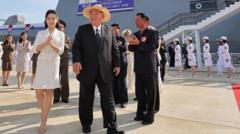As the nation grapples with political chaos and economic challenges, voters will choose a new leader to confront complex issues, including relations with the U.S. and North Korea.
### South Korea's Snap Presidential Election: Key Insights and Candidates

### South Korea's Snap Presidential Election: Key Insights and Candidates
With a presidential election set for June 3, South Korea faces a pivotal moment following the impeachment of President Yoon Suk Yeol.
The upcoming election on June 3 marks a critical juncture for South Korea as it seeks stability after the shocking impeachment of President Yoon Suk Yeol. Yoon’s short-lived presidency ended amidst political turmoil, following his declaration of martial law in December 2022, which ultimately led to his removal from office. Acting presidents have since stepped in, with Lee Ju-ho currently holding that position ahead of the impending election.
Polls suggest that the frontrunner for the presidency is Lee Jae-myung, the leader of the opposition Democratic Party. Lee, who narrowly lost to Yoon in the previous election, touts a campaign focused on social fairness and economic opportunities for the working class. In contrast, his likely opponent, Kim Moon-soo of the ruling People Power Party (PPP), seeks to appeal to business interests, promising an economically-friendly agenda.
The election will not only determine South Korea's political landscape for the next five years but also address pressing issues such as North Korean relations and the fallout from Yoon’s controversial decisions. With South Korea’s birth rate plummeting and domestic unrest boiling over into protests, these elections embody a critical moment for change in a nation divided by recent events.
Voting will occur from 06:00 to 20:00 local time on June 3, with preliminary results expected shortly after polls close. The newly elected president will assume office immediately, navigating the complex aftermath of Yoon’s controversial tenure amid rising tensions both regionally and internationally.
Polls suggest that the frontrunner for the presidency is Lee Jae-myung, the leader of the opposition Democratic Party. Lee, who narrowly lost to Yoon in the previous election, touts a campaign focused on social fairness and economic opportunities for the working class. In contrast, his likely opponent, Kim Moon-soo of the ruling People Power Party (PPP), seeks to appeal to business interests, promising an economically-friendly agenda.
The election will not only determine South Korea's political landscape for the next five years but also address pressing issues such as North Korean relations and the fallout from Yoon’s controversial decisions. With South Korea’s birth rate plummeting and domestic unrest boiling over into protests, these elections embody a critical moment for change in a nation divided by recent events.
Voting will occur from 06:00 to 20:00 local time on June 3, with preliminary results expected shortly after polls close. The newly elected president will assume office immediately, navigating the complex aftermath of Yoon’s controversial tenure amid rising tensions both regionally and internationally.





















